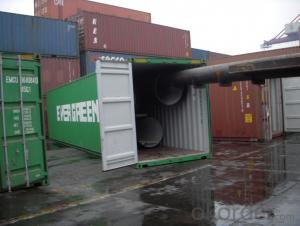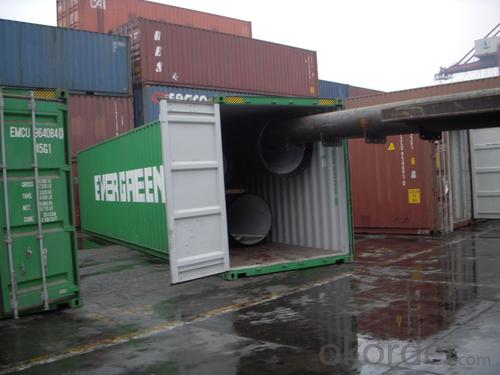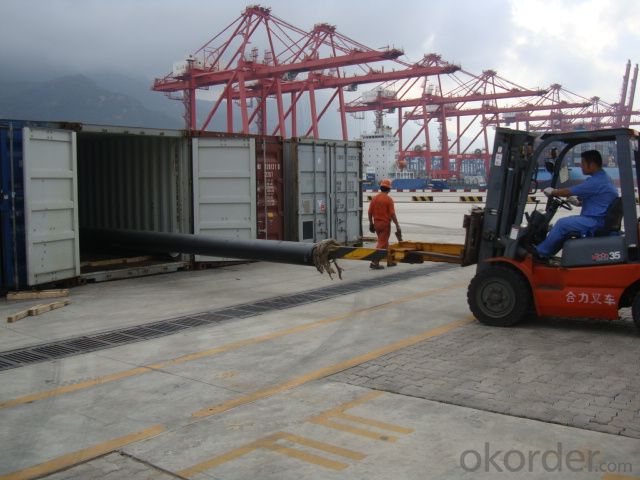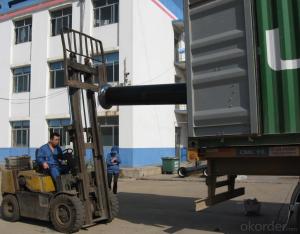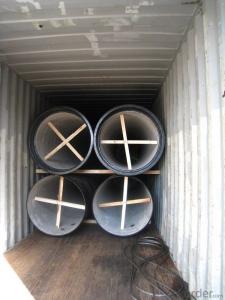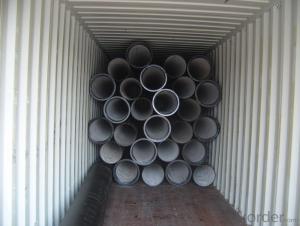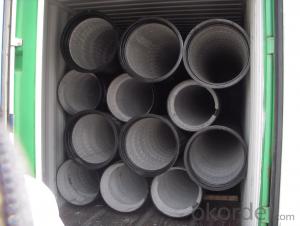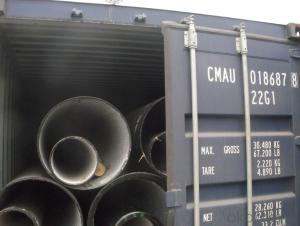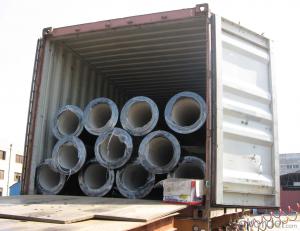DUCTILE IRON PIPE AND PIPE FITTINGS C CLASS DN300
- Loading Port:
- Tianjin
- Payment Terms:
- TT OR LC
- Min Order Qty:
- 23 pc
- Supply Capability:
- 3000 pc/month
OKorder Service Pledge
OKorder Financial Service
You Might Also Like
· Material : Ductile Cast Iron
· Size Range : DN 80mm to DN 2000mm
· Unit Effective Length : 6m or 5.7m
· Manufacture Standard: ISO 2531:1998/ EN 545:2006/EN 598:2007
· Annual capacity : 200,000 tons
· Coating Exterior: Zinc 130g/m2 according to ISO 8179-1 and bitumen coating 70 microns.
· Cement Interior: Portland Cement/ High Alumina Cement/ Sulphate Resisting Cement Lining according to ISO 4179
· Special requirements on external coating and internal lining can be applied
· We also provide accessories such as SBR/EPDM rubber gaskets, lubricant paste, pipe caps, PE sleeves, etc.
Additional Parts:
Each pipe is strictly inspected according to related standard to ensure permanently high performance.
Easy Installation at site and service free for life
Long Service Lifespan
Quotation will arrive you within 24hours once we get your inquiry.
We guarantee offering you a competitive price.
A copy of original inspection reports of pipes will be offered after shipment.
Photos of loading process will be sent to the customer after shipment effect.
We will follow-up the delivery progress after shipment effect and update to the customer on weekly basis.
- Q: How are ductile iron pipes protected against abrasion or wear?
- Various methods and protective coatings are utilized to protect ductile iron pipes against abrasion or wear. One commonly employed method involves the application of cement mortar lining on the inner surface of the pipe. This creates a smooth and durable layer that effectively resists the damaging effects of flowing water and other substances passing through the pipe. Furthermore, external protection for ductile iron pipes can be achieved by applying a bituminous or epoxy coating. These coatings act as a barrier, safeguarding against external factors like soil or chemicals that may lead to wear or corrosion. By serving as a protective layer, they prevent direct contact between the iron pipe and the surrounding environment. Moreover, in areas where severe abrasion or wear conditions are prevalent, special linings or coatings can be applied. Polyethylene encasement or polyurethane lining can be utilized to provide enhanced protection against abrasion, especially in regions where the pipe is exposed to high turbulence or abrasive materials. In certain cases, ductile iron pipes can also be reinforced with additional materials such as fiberglass or steel wire to increase their resistance to abrasion or wear. These reinforcements offer an extra layer of protection, strengthening the pipe and reducing the likelihood of damage. Overall, ductile iron pipes are designed with a combination of protective measures to ensure their durability and resistance to abrasion or wear. These measures encompass cement mortar linings, protective coatings, special linings or coatings for severe conditions, and reinforcements. These protective methods play a crucial role in prolonging the lifespan of the pipes and maintaining their functionality even in challenging environments.
- Q: What are the typical joint restraint requirements for ductile iron pipes under pressure?
- The typical joint restraint requirements for ductile iron pipes under pressure include the use of mechanical joint restraining devices such as bolts, gaskets, and thrust blocks. These restraints are necessary to prevent the pipes from separating or moving due to the internal pressure of the fluid being transported. Additionally, proper alignment and anchoring of the pipes are essential to ensure the integrity and stability of the pipeline system.
- Q: Can ductile iron pipe be used for wastewater treatment plant sludge handling?
- Indeed, ductile iron pipe is suitable for the handling of sludge in wastewater treatment plants. Possessing strength and durability, this material resists corrosion and endures the challenging conditions related to sludge management. Frequently employed in wastewater treatment plants for sludge transport, it ensures remarkable structural integrity and boasts an extended lifespan. Moreover, ductile iron pipe proves effortless to install and maintain, rendering it a pragmatic selection for sludge handling purposes within wastewater treatment plants.
- Q: What is the typical weight of ductile iron pipe?
- The typical weight of ductile iron pipe can vary depending on its diameter and wall thickness. However, as a general guideline, a 6-inch diameter ductile iron pipe with a wall thickness of 0.25 inches may weigh around 35 pounds per linear foot. Similarly, a 12-inch diameter ductile iron pipe with a wall thickness of 0.375 inches could weigh approximately 115 pounds per linear foot. It is important to note that these weight estimates are approximate and may vary slightly depending on the specific manufacturer and product specifications.
- Q: Are ductile iron pipes available in different wall thicknesses?
- Yes, ductile iron pipes are available in different wall thicknesses to accommodate various applications and requirements.
- Q: Can ductile iron pipe be used for stormwater systems?
- Yes, ductile iron pipe can be used for stormwater systems. It is a suitable material choice due to its strength, durability, and resistance to corrosion, making it capable of withstanding the demands of stormwater drainage systems.
- Q: Can ductile iron pipe be used for water well applications?
- Yes, ductile iron pipe can be used for water well applications. Ductile iron has excellent strength, durability, and corrosion resistance, making it suitable for transporting water in various applications, including water well systems.
- Q: What is the expected external protection system for ductile iron pipes?
- The expected external protection system for ductile iron pipes typically involves a combination of protective coatings and cathodic protection.
- Q: How are ductile iron pipes inspected for quality control?
- To guarantee compliance with industry standards, ductile iron pipes undergo a series of rigorous tests and inspections for quality control. Trained inspectors conduct visual inspections, carefully examining the pipes for visible defects like cracks, pits, or surface irregularities. This process aims to identify any visual flaws that could compromise the overall quality of the pipes. Dimensional inspection is another crucial quality control measure. Specialized tools and equipment are used to measure the pipes' dimensions, including diameter, wall thickness, and length. By comparing these measurements to specified tolerances, any deviations can be detected, and necessary corrective actions can be taken. Hydrostatic pressure testing is an important step in quality control. The pipes are subjected to internal pressure higher than their intended operating pressure to ensure they can withstand the required pressure without any leakage or failure. This test involves filling the pipes with water and gradually increasing the pressure while closely monitoring for any signs of leakage or deformation. Furthermore, mechanical tests such as tensile strength testing and impact testing are conducted to evaluate the pipes' mechanical properties. Controlled forces or impacts are applied to the pipes, and their response is measured. This allows for the assessment of the pipes' strength, toughness, and durability, ensuring they meet the necessary requirements. Metallurgical examinations are also carried out to analyze the microstructure of the ductile iron pipes. Samples are taken from the pipes, and microscopy techniques are used to examine the grain structure, phase distribution, and any potential defects at a microscopic level. This process helps identify any issues that may not be visible to the naked eye but could affect the overall quality of the pipes. Overall, the inspection process for ductile iron pipes encompasses a combination of visual, dimensional, hydrostatic, mechanical, and metallurgical tests. These quality control measures ensure that the pipes meet the required standards, providing reliable and durable infrastructure for various applications.
- Q: Is the water cast iron pipe 100% for hydrostatic test?
- As long as it's a water pipe, it must be tested. Otherwise, how do you know it leaks?.
Send your message to us
DUCTILE IRON PIPE AND PIPE FITTINGS C CLASS DN300
- Loading Port:
- Tianjin
- Payment Terms:
- TT OR LC
- Min Order Qty:
- 23 pc
- Supply Capability:
- 3000 pc/month
OKorder Service Pledge
OKorder Financial Service
Similar products
Hot products
Hot Searches
Related keywords
